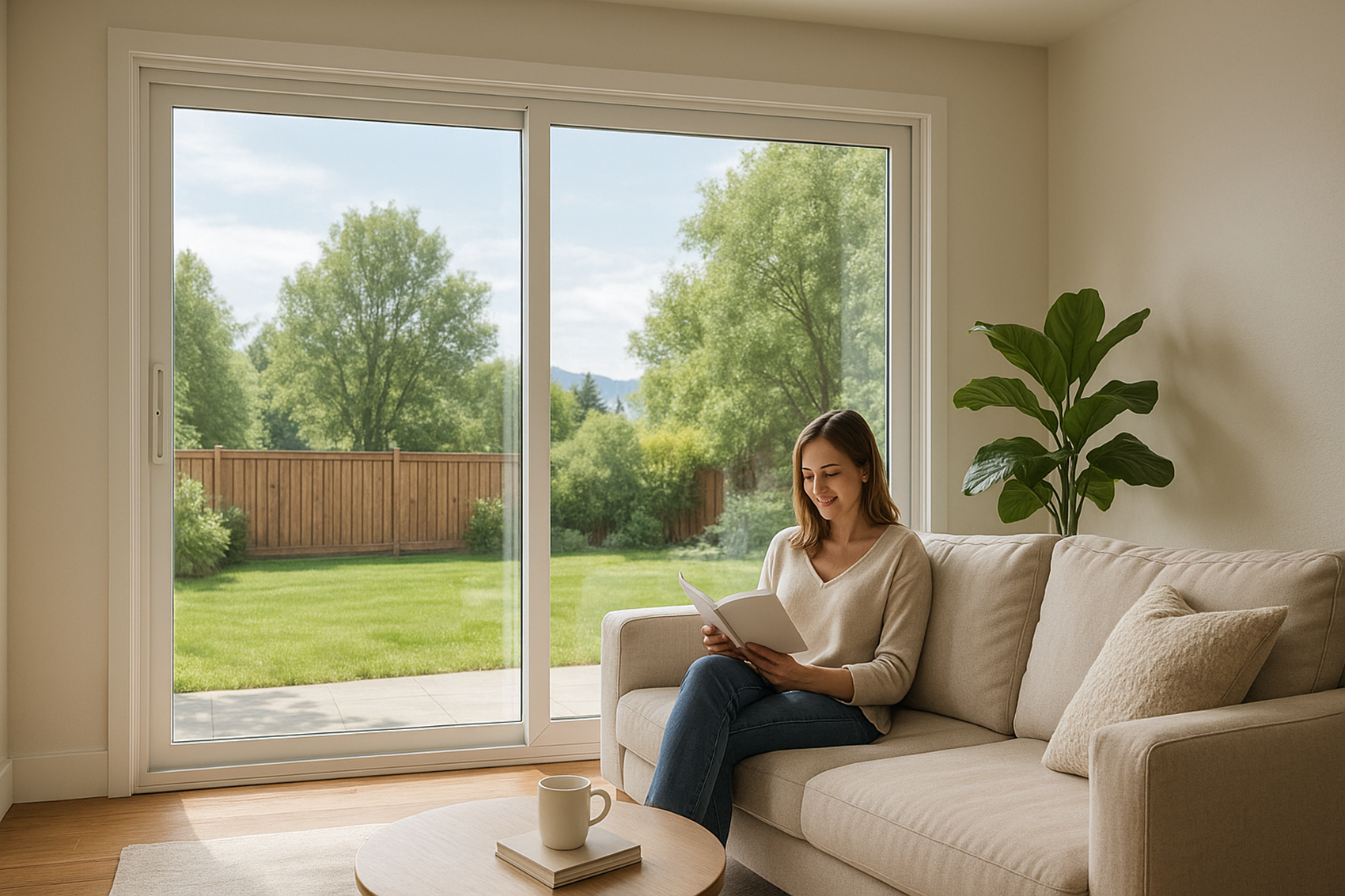Sliding glass doors with energy savings benefits deliver measurable utility bill reductions through advanced thermal technologies, Low-E coatings, and multi-pane construction that can reduce heating and cooling costs by 20-35% compared to standard single-pane patio doors. Modern energy-efficient sliding glass doors feature insulated frames, argon gas fills, and specialized glazing systems that prevent heat transfer while maintaining expansive views and natural light access.
According to ENERGY STAR data, qualifying sliding glass doors achieve U-factors of 0.30 or lower and Solar Heat Gain Coefficients optimized for different climate zones, resulting in annual energy savings of $150-400 per door for typical residential installations. These efficiency improvements translate to monthly utility bill reductions that homeowners notice immediately, with payback periods typically ranging from 5-8 years through energy savings alone.
Understanding how energy-efficient sliding glass doors actually reduce energy costs helps homeowners evaluate the real-world financial benefits of upgrading from standard patio doors to high-performance alternatives that provide both comfort improvements and quantifiable monthly savings.
Advanced Thermal Barrier Technologies
Multi-Pane Glass Systems with Gas Fills
Energy-efficient sliding glass doors utilize double or triple-pane glass construction with argon or krypton gas fills between panes to dramatically reduce heat transfer through conduction and convection. These insulated glass units can achieve thermal performance 200-300% better than single-pane alternatives while maintaining clarity and light transmission.
The gas fills create additional thermal barriers that slow heat movement between interior and exterior environments, reducing the workload on heating and cooling systems throughout seasonal temperature changes. This enhanced insulation translates directly to lower energy consumption and reduced utility bills during both heating and cooling seasons.
Thermally Broken Frame Construction
Premium sliding glass doors incorporate thermally broken frames that prevent heat conduction through metal components using insulating barriers between interior and exterior frame sections. This thermal break technology eliminates the thermal bridging that allows heat transfer through traditional aluminum frames.
The thermal isolation provided by broken frame construction can reduce frame heat transfer by 70-80% compared to standard aluminum frames, contributing significantly to overall door energy performance. This frame efficiency combines with glazing improvements to create comprehensive thermal barriers that reduce energy costs year-round.
Low-E Coatings and Solar Control
Selective Light Transmission Technology
Low-E (low-emissivity) coatings on energy-efficient sliding glass doors reflect infrared heat while allowing visible light to pass through, creating selective solar control that reduces cooling loads during summer while permitting beneficial solar heat gain during winter. These microscopic metallic coatings can reduce heat transfer by 30-50% without significantly affecting visibility.
Different Low-E coating formulations optimize performance for specific climate zones, with low-solar-gain coatings ideal for warm climates and moderate-solar-gain versions suited for mixed or cold climates. This climate-specific optimization ensures maximum energy savings regardless of regional weather patterns.
Year-Round Performance Benefits
Energy-efficient Low-E coatings provide benefits throughout annual weather cycles by reflecting unwanted heat during cooling seasons while retaining beneficial heat during heating periods. This dual-season performance creates consistent energy savings that accumulate throughout the year rather than providing benefits only during specific seasons.
The selective heat control also reduces UV transmission by 99%, protecting interior furnishings from fading while maintaining energy efficiency. This UV protection preserves interior investments while contributing to overall home comfort and energy performance.
Measurable Energy Cost Reductions
Quantified Monthly Savings
Energy-efficient sliding glass doors typically reduce monthly utility bills by $15-35 per door during peak heating and cooling seasons, with annual savings ranging from $150-400 depending on local energy costs and climate conditions. These savings become immediately apparent in utility bills following installation.
The energy cost reductions result from decreased HVAC runtime, reduced peak demand charges, and improved temperature stability that eliminates energy waste from frequent system cycling. Homeowners often report that their HVAC systems run more quietly and consistently after installing energy-efficient sliding doors.
Peak Load Reduction Benefits
Energy-efficient doors reduce peak energy demand during extreme weather periods when utility rates are highest, providing additional cost savings beyond base energy consumption reductions. This peak load management can save 10-20% on monthly utility bills during high-demand periods.
The demand reduction benefits become especially valuable in areas with time-of-use utility pricing where peak period rates significantly exceed off-peak charges. Energy-efficient sliding doors help homeowners avoid the highest utility rates while maintaining comfortable indoor conditions.
Comfort Improvements and HVAC Benefits
Temperature Consistency and Draft Elimination
Energy-efficient sliding glass doors eliminate hot and cold spots near patio entrances while maintaining consistent temperatures throughout adjacent living spaces. This temperature stability reduces HVAC system workload while improving comfort in areas that were previously difficult to heat or cool effectively.
The improved comfort extends to reduced noise transmission and elimination of condensation problems that commonly affect standard sliding doors. These comfort enhancements contribute to overall home livability while supporting energy efficiency goals.
Extended HVAC System Life
Reduced heating and cooling demands from energy-efficient sliding doors extend HVAC equipment life by reducing operating hours and system stress during extreme weather periods. This equipment protection provides additional value beyond direct energy savings through reduced maintenance and replacement costs.
The consistent indoor temperatures maintained by efficient doors prevent HVAC systems from short-cycling and overworking, maintaining optimal efficiency throughout equipment service life. This operational improvement protects HVAC investments while supporting long-term energy cost control.
Climate-Specific Energy Performance
Heating Dominated Climate Benefits
In heating-dominated climates, energy-efficient sliding glass doors provide substantial winter energy savings through improved insulation and selective solar heat gain that reduces heating system runtime. The dual benefits of heat retention and beneficial solar gain can reduce heating costs by 25-40% compared to standard doors.
The winter performance benefits include elimination of cold drafts, reduced condensation, and improved comfort near patio areas that allows fuller utilization of living spaces during cold weather. These comfort improvements complement direct energy savings to provide comprehensive winter performance benefits.
Cooling Dominated Climate Advantages
For cooling-dominated climates, energy-efficient sliding doors reduce air conditioning costs through superior heat rejection and solar control that prevents unwanted heat gain during summer months. The cooling load reduction can decrease summer energy costs by 20-35% while maintaining natural light and outdoor views.
The summer benefits include reduced solar heat gain, improved humidity control, and enhanced comfort during peak cooling periods. These performance improvements allow homeowners to maintain comfortable indoor conditions while reducing energy consumption during the most expensive cooling periods.
Return on Investment Analysis
Payback Period Calculations
Energy-efficient sliding glass doors typically achieve full cost recovery through energy savings within 5-8 years, with premium installations often paying for themselves within 6-10 years depending on local energy costs and performance improvements. The payback period shortens in areas with high energy costs or extreme climates.
The return on investment calculations include direct energy savings, HVAC maintenance reductions, and property value improvements that combine to create comprehensive financial benefits. Many homeowners recover their investment faster than projected due to utility rate increases and higher-than-expected energy savings.
Long-Term Value Creation
Beyond payback period calculations, energy-efficient sliding doors continue providing energy savings throughout their 20-30 year service life, creating substantial long-term value through accumulated savings that often exceed the initial investment by 200-300%. This long-term value creation makes energy-efficient doors an excellent investment for homeowners planning extended ownership.
The ongoing savings provide hedge against future utility rate increases while supporting home value appreciation through energy efficiency improvements. These combined benefits create compelling financial justification for investing in energy-efficient sliding door technology.

Technology Integration and Smart Features
Automated Solar Control Systems
Advanced energy-efficient sliding doors can integrate with automated shading systems and smart glass technologies that optimize solar control throughout daily and seasonal cycles. These automated features maximize energy savings while maintaining optimal lighting and view access.
Smart integration capabilities include connection with home automation systems that coordinate door performance with HVAC operation, lighting control, and weather monitoring for optimized energy management. This technology integration enhances energy savings while providing convenient operation and monitoring capabilities.
Performance Monitoring and Optimization
Some energy-efficient sliding door systems include performance monitoring capabilities that track energy savings and optimize operation based on usage patterns and weather conditions. This monitoring provides homeowners with data to quantify energy savings and identify optimization opportunities.
The performance data helps homeowners understand the relationship between door operation and energy consumption while providing documentation for utility rebates and energy efficiency programs. This monitoring capability supports ongoing energy management and optimization efforts.
For homeowners considering comprehensive energy improvements, understanding how other door features contribute to overall efficiency can help maximize energy savings. For detailed information about weather stripping benefits and protection features that enhance door performance, explore our comprehensive guide: 🔗Why Choose Entry Doors with Weather Stripping: Protection & Performance Advantages
People Also Ask About Sliding Glass Doors with Energy Savings Benefits
1. How much can energy-efficient sliding glass doors actually save on utility bills?
Energy-efficient sliding glass doors typically save $150-400 annually per door through reduced heating and cooling costs, with monthly savings of $15-35 during peak seasons. The exact savings depend on local energy rates, climate conditions, and the efficiency gap between old and new doors.
Homes replacing single-pane sliding doors with ENERGY STAR qualified units often see 20-35% reduction in energy costs related to patio door heat loss. The savings become immediately noticeable in utility bills following installation, with many homeowners reporting lower bills within the first month.
Cumulative savings over the door's 20-30 year service life often total $3,000-8,000 per door, providing substantial return on investment while improving comfort and reducing environmental impact. These long-term savings make energy-efficient doors valuable investments for homeowners prioritizing efficiency.
2. What makes sliding glass doors energy efficient compared to standard versions?
Energy-efficient sliding glass doors feature multi-pane glass with gas fills, Low-E coatings, thermally broken frames, and advanced weatherstripping that work together to reduce heat transfer by 60-80% compared to standard single-pane doors with aluminum frames.
The key technologies include insulated glass units that create thermal barriers, selective Low-E coatings that control solar heat gain, and thermally broken frames that prevent conductive heat transfer. These features combine to achieve ENERGY STAR performance ratings and significant energy savings.
Quality energy-efficient doors also incorporate superior sealing systems, durable hardware, and precision manufacturing that maintains performance throughout the door's service life. This comprehensive approach ensures consistent energy savings and long-term value for homeowners.
3. Do energy savings justify the higher cost of efficient sliding glass doors?
Yes, energy savings typically justify the premium cost of efficient sliding doors within 5-8 years through reduced utility bills, with continued savings providing substantial long-term value throughout the door's service life. The payback period often shortens due to utility rate increases and higher-than-expected performance.
The cost premium for energy-efficient doors ranges from $500-1,500 per door depending on features and quality, while annual energy savings of $150-400 provide clear payback timelines. Additional benefits including improved comfort, reduced maintenance, and increased property value enhance the overall value proposition.
Many utility companies and government programs offer rebates for ENERGY STAR qualified doors that reduce the initial cost premium, improving payback periods and making energy-efficient options more accessible to budget-conscious homeowners.
4. Which energy features provide the biggest savings for sliding glass doors?
Low-E coatings typically provide the largest single energy savings benefit by reducing heat transfer through glazing, followed closely by multi-pane construction with gas fills that dramatically improves insulation performance compared to single-pane alternatives.
Thermally broken frames provide significant savings in metal-framed doors by eliminating thermal bridging, while advanced weatherstripping and sealing systems prevent air infiltration that accounts for substantial energy loss in standard doors.
The combination of all energy features provides synergistic benefits that exceed the sum of individual improvements, making comprehensive energy-efficient door systems more valuable than doors with only selected efficiency features.
5. How do climate conditions affect energy savings from efficient sliding doors?
Climate conditions significantly affect energy savings potential, with extreme climates providing the greatest savings opportunities through larger temperature differentials between indoor and outdoor conditions. Cold climates see substantial winter heating savings, while hot climates benefit from reduced cooling costs.
Mixed climates often provide the most balanced year-round savings through both heating and cooling load reductions, while moderate climates may see smaller but still significant energy improvements. The key is selecting appropriate Low-E coatings and features optimized for specific climate zones.
Homeowners in areas with high utility rates or extreme weather conditions typically see faster payback periods and higher total savings, making energy-efficient doors especially valuable investments in challenging climate conditions.
Our Take
At Five Seasons Windows & Doors, our experience installing energy-efficient sliding glass doors throughout Colorado consistently demonstrates the significant utility bill reductions that quality doors provide. We regularly hear from customers who are surprised by the immediate impact on their monthly energy costs, often exceeding their expectations for energy savings.
Colorado's extreme temperature variations and high-altitude conditions make energy efficiency particularly valuable for sliding glass doors, with the combination of intense UV exposure and dramatic seasonal temperature swings testing door performance throughout the year. Our installations of premium doors from manufacturers like Marvin, ProVia, and Anlin consistently deliver the energy savings that justify the investment in quality.
We believe energy-efficient sliding glass doors represent one of the most measurable home improvements available, providing quantifiable monthly savings that homeowners can track while enjoying enhanced comfort and natural light. The combination of immediate energy savings and long-term value makes these doors smart investments for homeowners prioritizing both efficiency and financial returns.
Final Takeaway
Sliding glass doors with energy savings benefits deliver measurable utility bill reductions through advanced thermal technologies that create quantifiable monthly savings homeowners can see in their energy bills. The combination of Low-E coatings, multi-pane construction, and thermally broken frames provides 20-35% energy cost reductions that justify the investment through accumulated savings over the door's service life.
Understanding the specific technologies and performance features that generate these energy savings helps homeowners evaluate the real-world financial benefits of upgrading to energy-efficient sliding glass doors. The key lies in recognizing that these doors provide both immediate comfort improvements and long-term financial value through consistent energy cost reductions.
Professional installation of quality energy-efficient sliding glass doors delivers immediate utility bill reductions while providing decades of continued savings that often exceed the initial investment, making these doors valuable improvements for homeowners prioritizing both comfort and financial efficiency.
Get Started Today
Five Seasons Windows & Doors is Colorado’s top-rated local window company with 230+ 5-star reviews. We offer expert advice, no-pressure quotes, and flexible project options — including phased installs. Schedule your consult today.




